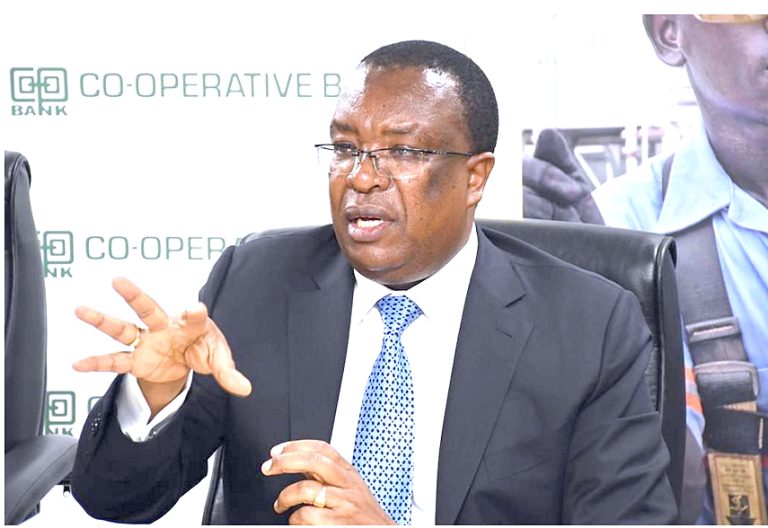How Kenya’s highest-paid CEO took home Ksh475M

Gideon Muriuki, the Chief Executive Officer of Co-operative Bank of Kenya, earned a staggering Ksh475 million compensation package last year, cementing his position as Kenya’s highest-paid CEO.
The substantial package included a base salary of Ksh172.5 million and performance bonuses totalling Ksh302.3 million.
To put this in perspective, Muriuki’s monthly salary of Ksh14.375 million translates to about Ksh59,896 per hour – nearly Ksh1,000 every minute.
These figures highlight the extraordinary scale of executive compensation at Kenya’s corporate apex.
The magnitude of this remuneration becomes even more striking when considered against Kenya’s development needs.
Muriuki’s annual earnings could provide Ksh1 million in startup capital to 475 small and medium-sized enterprises, a sector crucial for job creation and economic growth.
Alternatively, the sum could fund several modern primary healthcare centres or cover four-year university tuition for hundreds of students.
What drives compensation
This exceptional compensation package reflects Co-op Bank’s robust financial performance.
The lender announced a Ksh8.8 billion dividend payout to shareholders following a strong 9.8 per cent increase in net earnings to Ksh25.5 billion, up from Ksh23.2 billion in 2022.
The dividend of Ksh1.50 per share demonstrates the bank’s consistent payout strategy and sustained profitability.
Co-op Holdings Co-operative Society, representing Kenya’s cooperative movement and holding a 64.5 per cent stake, will receive the largest dividend share of Sh5.7 billion.
Key savings and credit co-operatives, including Harambee, H&M, Kenya Police Sacco, Afya, and Masaku Teachers, also feature among significant beneficiaries.
Muriuki personally benefited from the dividend distribution, earning Ksh160 million from his two per cent stake.
Subsidiary success
According to Muriuki, the bank’s earnings growth stemmed from increased interest and non-interest income combined with effective cost management.
He emphasised that this “strong performance has led to sustained increases in shareholder value, reflected in our competitive Return on Equity of 19.7 per cent”.
The bank’s impressive results received additional momentum from key subsidiaries Kingdom Bank Ltd and Co-op Bancassurance Intermediary Ltd, both achieving over Ksh1 billion in pre-tax earnings for the first time.
Muriuki credited the bank’s strategic focus on “resilience and growth across various economic sectors”, supported by its universal banking model, digital capabilities, and extensive physical network.
Banking performance
Co-op Bank expanded its footprint by opening eight new branches, reaching 211 outlets total, including five in South Sudan.
This expansion created 999 job opportunities for young bankers, bringing the bank’s workforce to 5,863 employees.
Co-op Bank joins KCB, Standard Chartered, and Stanbic Holdings as the fourth Tier One lender to announce full-year results.
These substantial dividend payouts signal optimism about Kenya’s economic future among major financial institutions, a trend expected to continue as other leading banks release their results, benefiting income-focused shareholders.
Benefit packages
Beyond direct compensation, senior executives in Kenya’s banking sector typically enjoy comprehensive benefits packages designed to attract and retain top talent.
These perks often include luxury travel, VIP security, private jet access, wardrobe allowances, personal drivers, private club memberships, housing allowances, entertainment budgets, and premium school fees for their children.
While Kenya’s broader economy faces significant challenges, the banking sector stands as a remarkable success story.
Top lenders collectively generated Ksh141 billion in post-tax profits during the last financial year, truly “smiling all the way to the bank” while other sectors struggle with economic headwinds.












